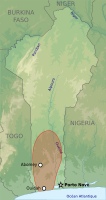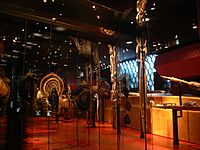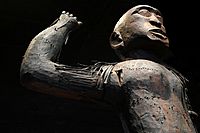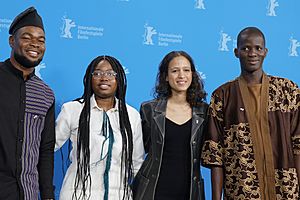Dahomey (film) facts for kids
Quick facts for kids Dahomey |
|
|---|---|
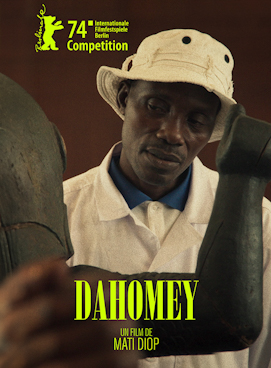
Festival release poster
|
|
| Directed by | Mati Diop |
| Produced by |
|
| Written by | Mati Diop |
| Music by | |
| Cinematography | Joséphine Drouin-Viallard |
| Editing by | Gabriel Gonzalez |
| Studio |
|
| Distributed by | Les Films du losange |
| Release date(s) | 18 February 2024 (Berlinale) 25 September 2024 (France) |
| Running time | 67 minutes |
| Country |
|
| Language | French |
Dahomey is a 2024 documentary film made by director Mati Diop. It tells the story of 26 valuable royal treasures. These treasures came from the Kingdom of Dahomey, which is now the country of Benin in West Africa. For a long time, these items were kept in a museum in France.
The film shows how these special artifacts were brought back from France to Benin. It also explores how the people of Benin felt about their return. This movie was made by companies from France, Senegal, and Benin working together.
Dahomey was shown at a big film festival called the 74th Berlin International Film Festival. It won the festival's top award, the Golden Bear. This means it was chosen as the best film there! It was also nominated for another award, the Berlinale Documentary Film Award. The film is planned to be shown in movie theaters in France starting September 25, 2024.
Contents
What is Dahomey About?
This documentary mixes real facts with some fictional parts. It tells the stories of 26 amazing African artworks. These royal items belonged to the Kingdom of Dahomey, which existed from about 1600 to 1904.
During a time called the colonial era, when some European countries took control of lands in Africa, these treasures were taken to France. For many years, they were displayed in a museum in Paris called the Musée du Quai Branly – Jacques Chirac.
Later, people campaigned to have these items returned to their home country. This process is called repatriation. Because of these efforts, the artifacts were finally sent back to Benin.
Among the returned items were statues of two kings of Dahomey, Glele and Béhanzin. Their royal throne, which French soldiers had taken in 1892, was also given back. Today, these art pieces are shown in a museum in Abomey. Abomey was the old royal city, located about 65 miles from the Gulf of Guinea coast.
The film also shows a discussion among students at the University of Abomey-Calavi. They share their thoughts about the return of these cultural treasures. Some students point out that only 26 items were returned, even though about 7,000 objects were taken.
One special art piece plays a big role in the film. It's the 26th object to be returned, a statue of King Ghézo. He ruled from 1818 to 1859. In the movie, a voice-over by Haitian writer Makenzy Orcel speaks as if he is this statue. The statue talks about its time stored in the Paris museum, its memories of Africa, and its feelings about coming home.
-
A view of the African exhibit hall at the Musée du Quai Branly – Jacques Chirac.
How Dahomey Was Made
The movie Dahomey was produced by Les Films du Bal, working with Fanta Sy. Les Films du Losange helped distribute the film. Mati Diop was the director and also wrote the script. Joséphine Drouin-Viallard was the director of photography, meaning she was in charge of how the film looked.
Gabriel Gonzalez edited the film. Mati Diop and Makenzy Orcel worked together on the text for the movie. The music was created by Wally Badarou and Dean Blunt. Corneille Houssou, Nicolas Becker, and Cyril Holtz were the sound designers. The film even uses footage from security cameras at the Musée du Quai Branly – Jacques Chirac and other places in Cotonou, Benin.
Film Release and Awards
The film Dahomey was first shown on February 18, 2024. This was at the 74th Berlin International Film Festival, where it was part of the main competition.
In January 2024, a company called Les Films du Losange bought the rights to sell the film. Then, in February 2024, Mubi bought the rights to show the film in many countries. These included North America, the United Kingdom, Germany, and India. Mubi plans to release the film later in 2024. In France, Les Films du Losange will release it in theaters on September 25, 2024.
Dahomey was chosen to compete at the 74th Berlin International Film Festival. There, it won the Golden Bear award for the best film! This is a huge honor. It was the second African film ever to win this top prize. The first was U-Carmen eKhayelitsha in 2015. It was also the second documentary in a row to win the Golden Bear.
When Mati Diop accepted the award, she gave a powerful speech. She asked people to "tear down the wall of silence together." She also spoke about "rebuilding through restitution," which means bringing justice by returning what was taken.
| Award | Date | Category | Recipient | Result | Ref. |
|---|---|---|---|---|---|
| Berlin International Film Festival | 25 February 2024 | Golden Bear | Mati Diop | Won | |
| Berlinale Documentary Film Award | Nominated |
Images for kids
-
Mati Diop holding the Golden Bear award at the Berlinale in 2024.
See also
 In Spanish: Dahomey (película de 2024) para niños
In Spanish: Dahomey (película de 2024) para niños
 | William M. Jackson |
 | Juan E. Gilbert |
 | Neil deGrasse Tyson |


